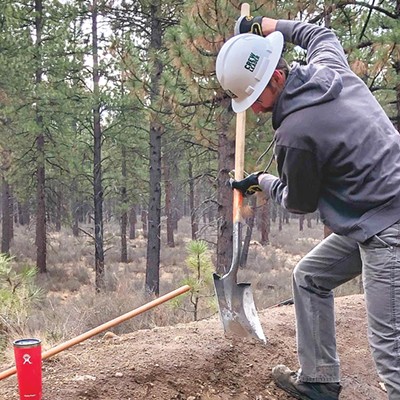In terms of public spending, Bend's arts community is like the kid who, perhaps unfairly, is picked last when teams are chosen for the recess kickball game. Which is strange considering the important role arts play in the region. Think concerts at the Tower Theatre, First Friday, roundabout art.
Yet, as far as public funding goes, the arts in Bend continue to get passed by in favor of other priorities.
"[Arts funding] is not part of the tradition here," asserts Arts Central Executive Director Cate O'Hagan.
But all that could change if the Bend Tourism, Arts & Public Safety Initiative is approved, a tourism tax proposed by a collective of local business, arts and public safety advocates. The group, backed by a broad spectrum of supporters, from successful businessmen to former mayors to the Bend Firefighters Association, hopes to put a tourism tax increase on the ballot in November.
If approved, the money would come from a 2-percent bump in the transient room tax, a bed tax paid by out-of-towners, not locals. The hotel tax would increase from the current 9 percent to 11 percent, which would generate an estimated $850,000 a year—$200,000 of which would be earmarked for art and culture programs.
On June 19, city council will host a public forum before deciding whether to put the transient room tax-rate issue to voters this fall. For O'Hagan and other representatives of area cultural nonprofits, the answer is already clear-cut.
"If you don't highlight arts and culture you leave cash on the table," O'Hagan says, explaining that anemic funding for the arts fails to broaden Bend's appeal beyond that of a recreation destination. Translation: Bend is missing obvious opportunities.
Not all of the monies raised from the proposed tax increase would go to cultural programs—most of it (approximately $400,000) would be used to extend Bend's tourism marketing reach, particularly in regard to winter tourism. Additionally, the city's police and fire services stand to gain roughly $250,000.
The advocacy group pushing for the tax bump said it would create an independent nonprofit, Bend Cultural Tourism Trust, that would manage the money earmarked by Visit Bend. The group would consist of representatives from the arts and culture communities, as well as one Visit Bend board member and would distribute the money based on the grant requests it received.
A number of area hoteliers, however, are none too pleased about the tax rate proposal, which they say would cut into profits.
Rocky Adrianson, The Riverhouse hotel manager, repeatedly has made impassioned pleas to city councilors, Visit Bend board members and fellow hoteliers to push back against the proposed 2-percent transient room tax hike. He says while he's all for the arts, now is not the time to raise the tax rate.
"Let the market heal," Adrianson implores. "We're just now re-achieving pre-recession market levels. Why impact that right now?" The longtime hotel manager fears he'd lose business over the 2-percent tax hike, and said that could result in lost jobs.
Adrianson is not alone in his opposition. A number of Bend hoteliers oppose a tourism tax increase, in part because they feel left out of the process.
"We want more money going to Visit Bend, but we'd like to feel like we have representation in this community," Adrianson says. Adrianson and his sympathizers say they have been unfairly left out of the conversation, even after city council promised in February to create a small committee to navigate the contentious subject. Councilors report that they're unclear why that committee was never formed.
Instead of increasing the tourism tax rate, Adrianson's solution is to allow hotel operators to raise their room rates on their own terms. Higher room rates generate similar funds for tourism, assuming the tax rate were to remain at 9 percent. Even with an increase as low as 2 percent, a forced tax, Adrianson said, is too much to bear—particularly when booking corporate groups in the hundreds, as The Riverhouse often does.
The issue of hoteliers butting heads with the city's tourism bureau is not a new one, but neither is it as clear-cut as private-sector hoteliers versus the city's tourism bureau. A number of downtown hotel groups, in fact, do support the proposed tourism tax; among them are representatives from The Oxford Hotel, Phoenix Inn & Suites and Bend Marriott as well Brasada Ranch and Eagle Crest Resorts.
Arts Central Executive Director O'Hagan says it is time to prioritize funding for the arts. She points out that not only is Bend's transient room tax on the low end for a tourist destination—Boise's is 13 percent and Portland's is 14.5 percent—it hasn't been adjusted since 2003.
"Cultural tourism has been around for decades," says O'Hagan. "It's time we catch up."























